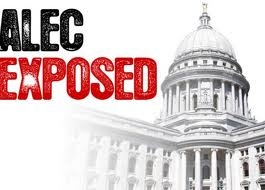ALEC staggers but will it fall?

By Phil Mattera, Dirt Diggers Digest
Wal-Mart's decision to drop its membership in the American Legislative Exchange Council is a milestone in the remarkable effort to drive a wedge between ALEC and the large corporations that have used the organization to promote their self-serving policy agenda at the state level.
At least 18 companies are reported to have cuts ties to ALEC in the face of a pressure campaign spearheaded by groups such as Color of Change, Common Cause, People for the American Way and the Center for Media and Democracy.
The campaign -- which has also prevailed against the likes of Amazon.com, Coca-Cola, Kraft Foods, McDonald's and Procter & Gamble -- is already one of the most successful corporate accountability initiatives ever undertaken, and more wins are likely to occur. Yet there are also high hurdles to overcome.
Those companies that have succumbed to the anti-ALEC pressure are pretty much all consumer products firms that were concerned about the possibility of boycotts on the part of customers outraged at ALEC's role in promoting "stand your ground" laws like the one in Florida at the center of the controversy over the shooting of Trayvon Martin.
A decisive win against ALEC will require splitting off a much larger portion of ALEC's sizeable corporate membership, including companies that are not fazed by consumer unrest. Quite a few firms of this sort are represented on ALEC's Private Enterprise Board, whose membership roll reads like a rogue's gallery of corporate irresponsibility.
The pharmaceutical industry, which has fought countless battles over pricing and safety and has been hit with billions of dollars in fines for illegal marketing practices, has several representatives on the board, including the senior vice president of its trade association PhRMA and officials from Bayer, GlaxoSmithKline and Pfizer.
Big tobacco, another battle-hardened industry, is represented by officials from Altria and Reynolds American. The national chair of the board, W. Preston Baldwin, is listed as being affiliated with the corporate strategy consulting firm Centerpoint360, but he used to be an executive with the chewing tobacco producer UST (now owned by Altria).
Also represented on the board are two leading villains of the natural resources sector -- petroleum behemoth and climate-change denier ExxonMobil and Peabody Energy, the largest private-sector coal producer in the world. For good measure, the board also includes a representative of Koch Industries, which is not only heavily involved in petrochemicals but is also, through the Koch Brothers, one of the primary backers of groups promoting the same kind of rightwing agenda pushed by ALEC.
Apart from those on the board, ALEC's membership list is believed to still include corporate bad actors such as ASARCO, Bank of America, BP America, Caterpillar, Chevron, Comcast, Corrections Corporation of America, Dow Chemical, Freeport-McMoRan Copper & Gold, Monsanto, Northrop Grumman, Shell Oil, T-Mobile and Verizon.
In other words, the effort to cleave off ALEC's corporate members will increasingly mean taking on companies that are not only notorious but which have a long track record of fending off challenges from labor, environmental and other progressive forces.
It's true that Wal-Mart, whose vice president for public affairs was serving as secretary on the ALEC board until the company's departure, is also part of that category. Yet Wal-Mart has been less combative of late, due in large part to the fallout from a foreign bribery scandal and its ongoing effort to give the impression of being an environmental leader. And it is a consumer-oriented company.
So what will it take to knock out these other ALEC loyalists? There's no easy answer, but it may be necessary for the campaign to treat the relationship of those firms to ALEC in a different way. Until now, the campaign has focused on making ALEC seem like a rogue organization that has adopted positions that diverge from the interests of the target companies. The online petition being circulated by Common Cause states:
Stop risking your company's reputation. Your association with the American Legislative Exchange Council aligns you and your stockholders with a partisan drive to deny millions of Americans their right to vote, an attack on public schools, and the proliferation of "Stand Your Ground" laws that promote vigilantism.
Your company probably joined ALEC to get help in lobbying for legislation that impacts your business. But ALEC's agenda these days puts the pursuit of private profit ahead of the public interest. It pulls business leaders like you into a radical ideological crusade involving issues that have nothing to do with your company.
Yet many of the companies listed above continue to support ALEC precisely because it is pursuing a radical ideological crusade that does have something to do with their interests. The anti-ALEC campaign will have to put more emphasis on the core issues that attract companies to the organization: business tax reduction, deregulation, privatization and other "fundamental principles of free-market enterprise, limited government, and federalism at the state level," as the ALEC mission statement puts it.
ALEC's identification with "stand your ground" and voter suppression opened an extraordinary opportunity to put the organization on the defensive, but in the end it is this broader corporate agenda that has to be confronted.
